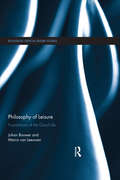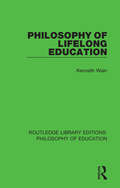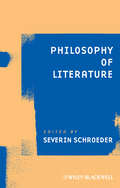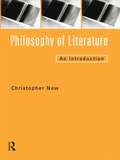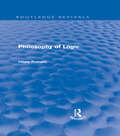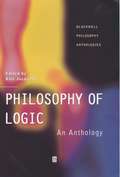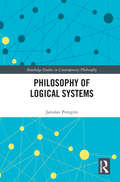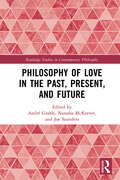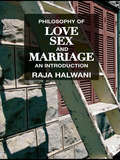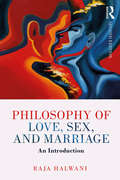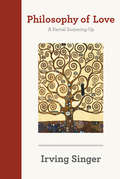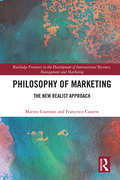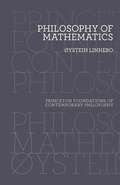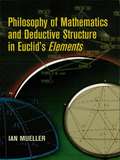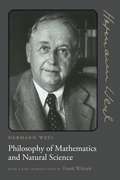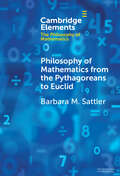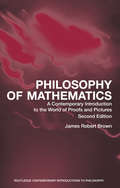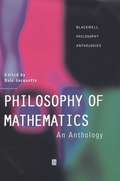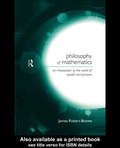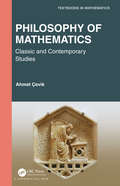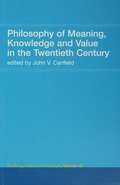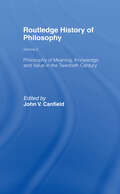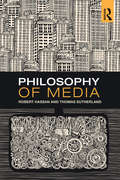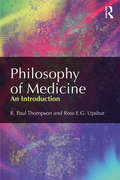- Table View
- List View
Philosophy of Leisure: Foundations of the good life (Routledge Critical Leisure Studies)
by Johan Bouwer Marco van LeeuwenWhat is leisure? How does leisure relate to leading a good life? This critical and intelligent study interrogates the basic principles of leisure and demonstrates the continuing relevance of these questions for our society today. It not only explores the traditional philosophical concepts at the heart of leisure studies, but also pursues new possibilities for reconceptualising leisure that have emerged from recent developments in society, technology and the broader discipline of philosophy itself. Approaching leisure from a philosophically inquisitive perspective, the book argues that leisure revolves around the pursuit of happiness, human flourishing and well-being, making it both a state of mind and a state of being. Its exploration of the meaning of leisure addresses key issues such as identity, ethics, spirituality, human experience, freedom, technology, embodiment, well-being, the fundamental properties of leisure and the challenge of offering a meaningful definition. Revitalising the subject of leisure studies with its originality, Philosophy of Leisure: Foundations of the Good Life is fascinating reading for all students and scholars of leisure studies, philosophy, sociology, psychology and ethics.
Philosophy of Lifelong Education (Routledge Library Editions: Philosophy of Education #19)
by Kenneth WainThis book, first published in 1987, provides a rigorous philosophical analysis of lifelong education. The author presents his arguments simply and directly so that the book is accessible to students who are new to philosophy and adult education.
Philosophy of Literature (Ratio Special Issues #7)
by Severin SchroederPhilosophy of Literature presents six newly-commissioned essays from international scholars that address some of the key issues relating to the philosophy of literature, a thriving and increasingly influential branch of aesthetics Features a half dozen newly commissioned articles from leading scholars in the field of philosophy of literature Focuses on a branch of aesthetics that has not received the attention it deserves Includes a reading on the historical relationship between philosophy and literature with recent developments and projections for the future Contributors include Peter Lamarque (University of York), Peter Kivy (Rutgers University, USA) and Stein Haugom Olsen (University of Bergen, Norway)
Philosophy of Literature: An Introduction
by Christopher NewLiterature, like the visual arts, poses its own philosophical problems. While literary theorists have discussed the nature of literature intensively, analytic philosophers have usually dealt with literary problems either within the general framework of aesthetics or else in a way that is accessible only to a philosophical audience. The present book is unique in that it introduces the philosophy of literature from an analytic perspective accessible to both students of literature and students of philosophy. Specifically, the book addresses: the definition of literature, the distinction between oral and written literature and the identity of literary worksthe nature of fiction and our emotional involvement with fictional charactersthe concept of imagination and its role in the apprehension of literary workstheories of metaphor and postmodernist theory on the significance of the authors' intentions to the interpretationof their workan examination of the relevance of thruth and morality to literary appreciationLucid and well organised and free from jargon, hilosophy of Literature: An Introduction offers fresh approaches to traditional problems and raises new issues in the philosophy of literature.
Philosophy of Logic (Routledge Revivals)
by Hilary PutnamFirst published in 1971, Professor Putnam's essay concerns itself with the ontological problem in the philosophy of logic and mathematics - that is, the issue of whether the abstract entities spoken of in logic and mathematics really exist. He also deals with the question of whether or not reference to these abstract entities is really indispensible in logic and whether it is necessary in physical science in general.
Philosophy of Logic: An Anthology (Blackwell Philosophy Anthologies: #14)
by Dale JacquetteThis volume provides a comprehensive collection of classic and contemporary readings in the philosophy of logic.
Philosophy of Logical Systems (Routledge Studies in Contemporary Philosophy)
by Jaroslav PeregrinThis book addresses the hasty development of modern logic, especially its introducing and embracing various kinds of artificial languages and moving from the study of natural languages to that of artificial ones. This shift seemed extremely helpful and managed to elevate logic to a new level of rigor and clarity. However, the change that logic underwent in this way was in no way insignificant, and it is also far from an insignificant matter to determine to what extent the "new logic" only engaged new and more powerful instruments to answer the questions posed by the "old" one, and to what extent it replaced these questions with new ones. Hence, this movement has generated brand new kinds of philosophical problems that have still not been dealt with systematically. Philosophy of Logical Systems addresses these new kinds of philosophical problems that are intertwined with the development of modern logic. Jaroslav Peregrin analyzes the rationale behind the introduction of the artificial languages of logic; classifies the various tools which were adopted to build such languages; gives an overview of the various kinds of languages introduced in the course of modern logic and the motifs of their employment; discusses what can actually be achieved by relocating the problems of logic from natural language into them; and reaches certain conclusions with respect to the possibilities and limitations of this "formal turn" of logic. This book is both an important scholarly contribution to the philosophy of logic and a systematic survey of the standard (and not so standard) logical systems that were established during the short history of modern logic.
Philosophy of Love in the Past, Present, and Future (Routledge Studies in Contemporary Philosophy)
by André GrahleThis volume features original essays on the philosophy of love. The essays are organized thematically around the past, present, and future of philosophical thinking about love. In Part I, the contributors explore what we can learn from the history of philosophical thinking about love. The chapters cover Ancient Greek thinkers, namely Plato and Aristotle, as well as Kierkegaard’s critique of preferential love and Erich Fromm’s mystic interpretation of sexual relations. Part II covers current conceptions and practices of love. These chapters explore how love changes over time, the process of falling in love, the erotic dimension of romantic love, and a new interpretation of grand-parental love. Finally, Part III looks at the future of love. These chapters address technological developments related to love, such as algorithm-driven dating apps and robotic companions, as well as the potential of polyamory as a future romantic ideal. This book will be of interest to researchers and advanced students in moral philosophy and social and political philosophy who are working on issues related to the philosophy of love.
Philosophy of Love, Sex, and Marriage: An Introduction
by Raja HalwaniHow is love different from lust or infatuation? Do love and marriage really go together “like a horse and carriage”? Does sex have any necessary connection to either? And how important are love, sex, and marriage to a well-lived life? In this lively, lucid, and comprehensive textbook, Raja Halwani pursues the philosophical questions inherent in these three important aspects of human relationships, exploring the nature, uses, and ethics of romantic love, sexuality, and marriage. The book is structured in three parts: Love begins by examining how romantic love differs from other types of love, such as friendship and parental love. It asks which properties of love are essential, whether people have a choice in whom they love, and whether lovers have moral obligations to one another that differ from those they owe to others Sex demonstrates the difficulty in defining sex and the sexual, and examines what constitutes good and bad sex in terms of pleasure, 'naturalness', and moral permissibility. It offers theoretical and applied ethical approaches to a wide range of sexual phenomena Marriage traces the history of the institution, and describes the various forms in which marriage exists and the reasons why people marry. It also surveys accounts of why people should or should not marry, and introduces the main arguments for and against gay marriage. Features include: suggestions for further reading online eResource site with dowloadable discussion questions a clear, jargon-free writing style.
Philosophy of Love, Sex, and Marriage: An Introduction
by Raja HalwaniHow is love different from lust or infatuation? Do love and marriage really go together "like a horse and carriage"? Does sex have any necessary connection to either? And how important are love, sex, and marriage to a well-lived life? In the Second Edition of this lively, lucid, and comprehensive book, Raja Halwani explores and elucidates the nature, uses, and ethics of romantic love, sexuality, and marriage. It is structured in three parts: Love examines the nature of romantic love and how it differs from other types of love, such as friendship and parental love. It also investigates the relationship of love to morality and asks what limits morality puts on romantic love and even whether romantic love is inherently moral. Sex demonstrates the difficulty in defining sex and the sexual, and examines what constitutes good and bad sex in terms of pleasure, "naturalness," and moral permissibility. It discusses the nature of sexual desire and its connection to objectification and virtue, all the while looking at specific sexual engagements such as pornography, BDSM, and raced desires. Marriage traces the history of the institution and describes the various forms in which marriage exists and the reasons why people marry. It also investigates the necessity of marriage and ways in which it requires reform. Updates and Revisions in the Second Edition Expands the coverage of love and morality from one to two chapters, incorporating much of the recent literature on love as a moral emotion. Includes a new chapter on sex and virtue ethics. Ends each of the chapters on sex with an "applied" topic, such as pornography, BDSM, prostitution, racial sexual desires, and adultery. Increases coverage of the nature and purpose of marriage, including debates surrounding same-sex marriage, but also moving beyond these debates to include issues on minimal marriage, temporary marriage, polygamy, and other forms of marriage. Updates the Further Reading and Study Questions sections at the end of each chapter and provides an up-to-date comprehensive bibliography at the back of the book. Includes new discussions of topics on the nature of love; love and reasons; distinctions between two types of romantic love; love and its connections to moral theories; definitions of crucial sexual concepts; objectification; virtue and sex; racial sexual desires; and the definition of marriage and whether it is important as an institution.
Philosophy of Love: A Partial Summing-Up (The Irving Singer Library)
by Irving SingerThe author of the classic philosophical treatment of love reflects on the trajectory, over decades, of his thoughts on love and other topics.In 1984, Irving Singer published the first volume of what would become a classic and much acclaimed trilogy on love. Trained as an analytical philosopher, Singer first approached his subject with the tools of current philosophical methodology. Dissatisfied by the initial results (finding the chapters he had written “just dreary and unproductive of anything”), he turned to the history of ideas in philosophy and the arts for inspiration. He discovered an immensity of speculation and artistic practice that reached wholly beyond the parameters he had been trained to consider truly philosophical. In his three-volume work The Nature of Love, Singer tried to make sense of this historical progression within a framework that reflected his precise distinction-making and analytical background. In this new book, he maps the trajectory of his thinking on love. It is a “partial” summing-up of a lifework: partial because it expresses the author's still unfolding views, because it is a recapitulation of many published pages, because love—like any subject of that magnitude—resists a neatly comprehensive, all-inclusive formulation. Adopting an informal, even conversational, tone, Singer discusses, among other topics, the history of romantic love, the Platonic ideal, courtly and nineteenth-century Romantic love; the nature of passion; the concept of merging (and his critique of it); ideas about love in Freud, Schopenhauer, Nietzsche, Dewey, Santayana, Sartre, and other writers; and love in relation to democracy, existentialism, creativity, and the possible future of scientific investigation. Singer's writing on love embodies what he has learned as a contemporary philosopher, studying other authors in the field and “trying to get a little further.” This book continues his trailblazing explorations.
Philosophy of Marketing: The New Realist Approach (Routledge Frontiers in the Development of International Business, Management and Marketing)
by Matteo Giannasi Francesco CasarinHow can we overcome the rapidly ageing postmodernist paradigm, which has become sterile orthodoxy in marketing? This book answers this crucial question using fresh philosophical tools developed by New Realism. It indicates the opportunities missed by marketing due to the pervasive postmodernist ideology, and propose a new and fruitful approach pivoting on the significance of reality to marketing analyses and models. Intensifying reference to reality will boost marketing research and practice, rather than impair them; conversely, neglecting such a reference will marketing from realising its full potential, in several contexts. The aim of the book is foundational: its purpose is not a return to traditional realism, but to break new ground and overcome theoretical obstacles, in marketing and management, by revising some of their assumptions and by enriching their categories, thereby paving the way to fresh approaches and methodological innovations. In that sense, the book encourages theoretical innovation and experimentation, and introduces new concepts, like invitation and attrition, which can find fruitful applications in marketing theory and practice. That is meant to be conductive to the solution of important difficulties and to the uncovering of new phenomena. The last chapter of the book applies the new approach to eight case studies from business contexts. This book will be of interest to philosophers interested in New Realism and to researchers, scholars and marketing professionals sensitive to the importance and fruitfulness of reference to reality, for their own purposes.
Philosophy of Mathematics (Princeton Foundations of Contemporary Philosophy #15)
by Øystein LinneboA sophisticated, original introduction to the philosophy of mathematics from one of its leading contemporary scholarsMathematics is one of humanity's most successful yet puzzling endeavors. It is a model of precision and objectivity, but appears distinct from the empirical sciences because it seems to deliver nonexperiential knowledge of a nonphysical reality of numbers, sets, and functions. How can these two aspects of mathematics be reconciled? This concise book provides a systematic yet accessible introduction to the field that is trying to answer that question: the philosophy of mathematics.Written by Øystein Linnebo, one of the world's leading scholars on the subject, the book introduces all of the classical approaches to the field, including logicism, formalism, intuitionism, empiricism, and structuralism. It also contains accessible introductions to some more specialized issues, such as mathematical intuition, potential infinity, the iterative conception of sets, and the search for new mathematical axioms. The groundbreaking work of German mathematician and philosopher Gottlob Frege, one of the founders of analytic philosophy, figures prominently throughout the book. Other important thinkers whose work is introduced and discussed include Immanuel Kant, John Stuart Mill, David Hilbert, Kurt Gödel, W. V. Quine, Paul Benacerraf, and Hartry H. Field.Sophisticated but clear and approachable, this is an essential introduction for all students and teachers of philosophy, as well as mathematicians and others who want to understand the foundations of mathematics.
Philosophy of Mathematics and Deductive Structure in Euclid's Elements (Dover Books on Mathematics)
by Ian MuellerA survey of Euclid's Elements, this text provides an understanding of the classical Greek conception of mathematics. It offers a well-rounded perspective, examining similarities to modern views as well as differences. Rather than focusing strictly on historical and mathematical issues, the book examines philosophical, foundational, and logical questions.Although comprehensive in its treatment, this study represents a less cumbersome, more streamlined approach than the classic three-volume reference by Sir Thomas L. Heath (also available from Dover Publications). To make reading easier and to facilitate access to individual analyses and discussions, the author has included helpful appendixes. These list special symbols and additional propositions, along with all of the assumptions and propositions of the Elements and notations of their discussion within this volume.
Philosophy of Mathematics and Natural Science
by Hermann WeylWhen mathematician Hermann Weyl decided to write a book on philosophy, he faced what he referred to as "conflicts of conscience"--the objective nature of science, he felt, did not mesh easily with the incredulous, uncertain nature of philosophy. Yet the two disciplines were already intertwined. In Philosophy of Mathematics and Natural Science, Weyl examines how advances in philosophy were led by scientific discoveries--the more humankind understood about the physical world, the more curious we became. The book is divided into two parts, one on mathematics and the other on the physical sciences. Drawing on work by Descartes, Galileo, Hume, Kant, Leibniz, and Newton, Weyl provides readers with a guide to understanding science through the lens of philosophy. This is a book that no one but Weyl could have written--and, indeed, no one has written anything quite like it since.
Philosophy of Mathematics from the Pythagoreans to Euclid (Elements in the Philosophy of Mathematics)
by Barbara M. SattlerThis Element looks at the very beginning of the philosophy of mathematics in Western thought. It covers the first reflections on attempts to untie mathematics from its practical usage in administration, commerce, and land-surveying and discusses the first ideas to see mathematical structures as constituents underlying the physical world in the Pythagoreans. The first two sections focus on the epistemic status of mathematical knowledge in relation to philosophical knowledge and on the various ontological positions ancient Greek philosophers in early and classical times ascribe to mathematical objects – from independent and separate entities to mere abstractions and idealisations. Section 3 discusses the paradigmatic role mathematical deductions have played for philosophy, the role of mathematical diagrams, and mathematical methods of interest for philosophers. Section 4, finally, investigates a couple of individual concepts that are fundamental for both philosophy and mathematics, such as infinity.
Philosophy of Mathematics in the Twentieth Century
by Charles ParsonsIn this illuminating collection, Charles Parsons surveys the contributions of philosophers and mathematicians who shaped the philosophy of mathematics over the course of the past century. Parsons begins with a discussion of the Kantian legacy in the work of L. E. J. Brouwer, David Hilbert, and Paul Bernays, shedding light on how Bernays revised his philosophy after his collaboration with Hilbert. He considers Hermann Weyl's idea of a "vicious circle" in the foundations of mathematics, a radical claim that elicited many challenges. Turning to Kurt Godel, whose incompleteness theorem transformed debate on the foundations of mathematics and brought mathematical logic to maturity, Parsons discusses his essay on Bertrand Russell's mathematical logic--Godel's first mature philosophical statement and an avowal of his Platonistic view. Philosophy of Mathematics in the Twentieth Century" insightfully treats the contributions of figures the author knew personally: W. V. Quine, Hilary Putnam, Hao Wang, and William Tait. Quine's early work on ontology is explored, as is his nominalistic view of predication and his use of the genetic method of explanation in the late work The Roots of Reference. " Parsons attempts to tease out Putnam's views on existence and ontology, especially in relation to logic and mathematics. Wang's contributions to subjects ranging from the concept of set, minds, and machines to the interpretation of Godel are examined, as are Tait's axiomatic conception of mathematics, his minimalist realism, and his thoughts on historical figures.
Philosophy of Mathematics: A Contemporary Introduction to the World of Proofs and Pictures (Routledge Contemporary Introductions to Philosophy)
by James Robert BrownIn his long-awaited new edition of Philosophy of Mathematics, James Robert Brown tackles important new as well as enduring questions in the mathematical sciences. Can pictures go beyond being merely suggestive and actually prove anything? Are mathematical results certain? Are experiments of any real value? This clear and engaging book takes a unique approach, encompassing non-standard topics such as the role of visual reasoning, the importance of notation, and the place of computers in mathematics, as well as traditional topics such as formalism, Platonism, and constructivism. The combination of topics and clarity of presentation make it suitable for beginners and experts alike. The revised and updated second edition of Philosophy of Mathematics contains more examples, suggestions for further reading, and expanded material on several topics including a novel approach to the continuum hypothesis.
Philosophy of Mathematics: An Anthology
by Dale JacquetteThis distinctive anthology explores the central problems and exposes intriguing new directions in the philosophy of mathematics.
Philosophy of Mathematics: An Introduction to a World of Proofs and Pictures (Philosophical Issues in Science)
by James Robert BrownPhilosophy of Mathematics is an excellent introductory text. This student friendly book discusses the great philosophers and the importance of mathematics to their thought. It includes the following topics:* the mathematical image* platonism* picture-proofs* applied mathematics* Hilbert and Godel* knots and nations* definitions* picture-proofs and Wittgenstein* computation, proof and conjecture.The book is ideal for courses on philosophy of mathematics and logic.
Philosophy of Mathematics: Classic and Contemporary Studies (Textbooks in Mathematics)
by Ahmet CevikThe philosophy of mathematics is an exciting subject. Philosophy of Mathematics: Classic and Contemporary Studies explores the foundations of mathematical thought. The aim of this book is to encourage young mathematicians to think about the philosophical issues behind fundamental concepts and about different views on mathematical objects and mathematical knowledge. With this new approach, the author rekindles an interest in philosophical subjects surrounding the foundations of mathematics. He offers the mathematical motivations behind the topics under debate. He introduces various philosophical positions ranging from the classic views to more contemporary ones, including subjects which are more engaged with mathematical logic. Most books on philosophy of mathematics have little to no focus on the effects of philosophical views on mathematical practice, and no concern on giving crucial mathematical results and their philosophical relevance, consequences, reasons, etc. This book fills this gap. The book can be used as a textbook for a one-semester or even one-year course on philosophy of mathematics. "Other textbooks on the philosophy of mathematics are aimed at philosophers. This book is aimed at mathematicians. Since the author is a mathematician, it is a valuable addition to the literature." - Mark Balaguer, California State University, Los Angeles "There are not many such texts available for mathematics students. I applaud efforts to foster the dialogue between mathematics and philosophy." - Michele Friend, George Washington University and CNRS, Lille, France
Philosophy of Meaning, Knowledge and Value in the 20th Century: Routledge History of Philosophy Volume 10 (Routledge History Of Philosophy Ser. #Vol. 10)
by John V. CanfieldThe twentieth century brought enormous change to subjects such as language, metaphysics, ethics and epistemology. This volume covers the major developments in these areas and more.
Philosophy of Meaning, Knowledge and Value in the Twentieth Century: Routledge History of Philosophy Volume 10 (Routledge History of Philosophy #Vol. 10)
by John V. CanfieldVolume 10 of the Routledge History of Philosophy presents a historical survey of the central topics in twentieth century Anglo-American philosophy. It chronicles what has been termed the 'linguistic turn' in analytic philosophy and traces the influence the study of language has had on the main problems of philosophy. Each chapter contains an extensive bibliography of the major writings in the field.All the essays present their large and complex topics in a clear and well organised way. At the end, the reader finds a helpful Chronology of the major political, scientific and philosophical events in the Twentieth Century and an extensive Glossary of technical terms.
Philosophy of Media: A Short History of Ideas and Innovations from Socrates to Social Media
by Robert Hassan Thomas SutherlandSince the late-1980s the rise of the Internet and the emergence of the Networked Society have led to a rapid and profound transformation of everyday life. Underpinning this revolution is the computer – a media technology that is capable of not only transforming itself, but almost every other machine and media process that humans have used throughout history. In Philosophy of Media, Hassan and Sutherland explore the philosophical and technological trajectory of media from Classical Greece until today, casting a new and revealing light upon the global media condition. Key topics include: the mediation of politics the question of objectivity automata and the metaphor of the machine analogue and digital technological determinism. Laid out in a clear and engaging format, Philosophy of Media provides an accessible and comprehensive exploration of the origins of the network society. It is essential reading for students of philosophy, media theory, politics, history and communication studies.
Philosophy of Medicine: An Introduction
by R. Paul Thompson Ross E.G. UpshurWhat kind of knowledge is medical knowledge? Can medicine be explained scientifically? Is disease a scientific concept, or do explanations of disease depend on values? What is "evidence-based" medicine? Are advances in neuroscience bringing us closer to a scientific understanding of the mind? The nature of medicine raises fundamental questions about explanation, causation, knowledge and ontology – questions that are central to philosophy as well as medicine. This book introduces the fundamental issues in philosophy of medicine for those coming to the subject for the first time, including: • understanding the physician–patient relationship: the phenomenology of the medical encounter. • Models and theories in biology and medicine: what role do theories play in medicine? Are they similar to scientific theories? • Randomised controlled trials: can scientific experiments be replicated in clinical medicine? What are the philosophical criticisms levelled at RCTs? • The concept of evidence in medical research: what do we mean by "evidence-based medicine"? Should all medicine be based on evidence? • Causation in medicine. • What do advances in neuroscience reveal about the relationship between mind and body? • Defining health and disease: are explanations of disease objective or do they depend on values? • Evolutionary medicine: what is the role of evolutionary biology in understanding medicine? Is it relevant? Extensive use of empirical examples and case studies are included throughout, including debates about smoking and cancer, the use of placebos in randomised controlled trials, controversies about PSA testing and research into the causes of HIV. This is an indispensable introduction to those teaching philosophy of medicine and philosophy of science.
